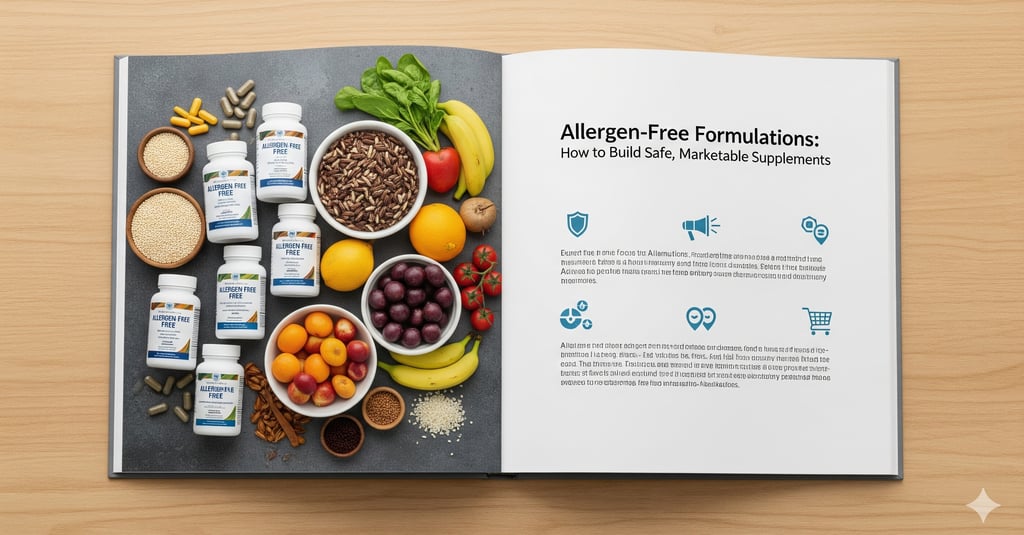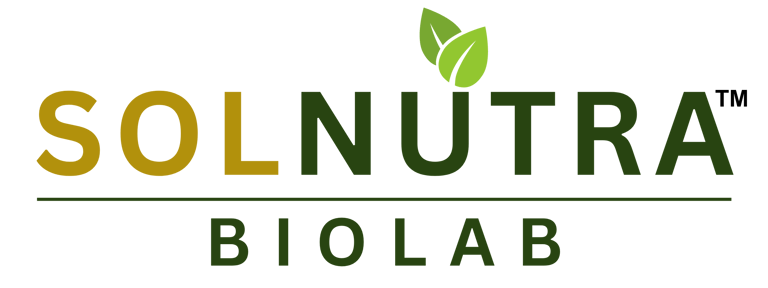Allergen-Free Formulations: How to Build Safe, Marketable Supplements
4 min read


Understanding Common Allergens in Supplements
Dietary supplements have gained immense popularity as individuals seek to enhance their health and wellness through various nutrients and compounds. However, the presence of allergens in these formulations can pose significant risks to consumers with specific food allergies and sensitivities. The most prevalent allergens often found in supplements include gluten, dairy, soy, nuts, and shellfish. Understanding these allergens is crucial for both manufacturers and consumers.
Gluten, a protein found in wheat, barley, and rye, can trigger severe reactions in individuals with celiac disease or gluten sensitivity. As gluten-containing ingredients are commonly used in many products, including protein powders and capsules, it is essential for manufacturers to offer gluten-free options to ensure safety for those affected.
Dairy is another common allergen, often present in supplement formulations as whey or casein protein. Consumers who are lactose intolerant or have a milk allergy need to be keenly aware of dairy-derived ingredients to avoid adverse reactions. This necessitates the development of dairy-free alternatives that can cater to a broader audience.
Soy is widely used as a protein source and emulsifier in supplements but can be problematic for those with soy allergies. Formulations that incorporate soy must clearly label their presence to guide consumers in making informed choices. Similarly, nuts and shellfish are allergens that can result in severe allergic reactions, and their inclusion in dietary supplements may limit market accessibility for individuals with these allergies.
With the increasing prevalence of food allergies worldwide, the emphasis on creating allergen-free formulations is paramount. Product developers must prioritize awareness of these allergens during the formulation process, implementing stringent testing and labeling protocols. This vigilance not only ensures consumer safety but also enhances the marketability of supplements in an increasingly health-conscious landscape.
Labeling Best Practices in Canada and the US
When developing allergen-free formulations, it is crucial to adhere to the regulatory requirements for labeling in both Canada and the United States. In Canada, the Food and Drugs Act, along with the Consumer Packaging and Labelling Act, provides the legal framework for food labeling. Specifically, the Canadian Food Inspection Agency (CFIA) mandates that all prepackaged food must include a list of ingredients, which must be presented in a clear and legible manner. This is especially important for allergen-free products, as they often cater to individuals with dietary restrictions. Key allergens, such as peanuts, tree nuts, dairy, wheat, soy, and eggs, must be clearly declared either in the ingredient list or in a designated allergen statement.
In the United States, the Food and Drug Administration (FDA) oversees food labeling regulations under the Food Allergens Labeling and Consumer Protection Act (FALCPA). Similar to Canada, the FDA requires that food products clearly disclose the presence of specified allergens. This includes a mandatory statement for major food allergens that must be highlighted in a manner that ensures visibility to consumers, thereby facilitating informed decision-making. The FDA encourages manufacturers to use language that is straightforward and understandable, highlighting allergens in bold or contrasting colors to enhance recognition.
Both countries emphasize the importance of transparency and accuracy in allergen labeling. Proper labeling not only complies with legal requirements but also builds consumer trust. Misleading or unclear labels can lead to significant health risks for individuals with allergies, creating potential liabilities for manufacturers. To cultivate transparency, it is advisable to inform consumers regarding the potential for cross-contamination in the manufacturing process, particularly if the facility also processes allergens. By implementing clear labeling best practices, companies can foster a dependable brand image while also ensuring compliance with both Canadian and American regulations.
Manufacturing Segregation and Testing Protocols
To create allergen-free supplements, it is critical to establish stringent manufacturing practices aimed at preventing cross-contamination with allergens. One of the foremost strategies is the segregation of production lines dedicated solely to allergen-free formulations. This ensures that any residues or traces of allergens do not contaminate products intended for sensitive consumers. Manufacturing facilities should have clearly delineated areas for allergen-free products, including the use of distinct equipment and utensils to eliminate the risk of cross-contact. Implementing separate production schedules may also be advisable, scheduling allergen-free runs after those involving allergenic materials to further mitigate risks.
Additionally, shared equipment must adhere to strict cleaning protocols. Thorough sanitation procedures should be enacted that include use of allergen-specific cleaning agents and verification of cleanliness through swab testing before allergen-free production commences. This not only involves regular audits of cleanliness protocols but also thorough staff training to ensure compliance with allergen-free manufacturing standards.
Complementing these segregation practices, robust testing protocols are essential to verify that products maintain their allergen-free status throughout production. Testing should be conducted at various stages, including raw material sourcing, in-process testing, and final product evaluation. Employing advanced analytical techniques, such as enzyme-linked immunosorbent assays (ELISA) or polymerase chain reaction (PCR), can effectively detect minute traces of allergens. Regular testing combined with batch sampling can assure consistency in product quality and enable rapid response mechanisms should any test return a positive result.
Rigorous quality control measures ensure that allergen-free supplements are not only safe for consumers but also marketable and reliable in maintaining their allergen-free claims. Such comprehensive measures reinforce consumer confidence and uphold industry standards throughout the supplement manufacturing process.
Clean-Label Marketing Strategies and Compliance
In today's competitive supplement market, clean-label marketing is essential for addressing consumer concerns over product safety and ingredient transparency. To effectively communicate allergen-free attributes, brands must adopt marketing strategies that comply with regulatory standards while fostering trust with consumers. Clear labeling of allergen-free products not only provides vital information but also boosts customer confidence. Ensuring that all label claims are accurate, honest, and substantiated is critical in avoiding misleading representations.
One significant aspect of clean-label marketing is the use of clear and straightforward language to convey allergen-free formulations. For example, instead of using technical jargon, brands may emphasize terms such as "free from common allergens" or "manufactured in an allergen-controlled environment." These phrases resonate with consumers who seek safer options. Additionally, clear communication on potential cross-contamination risks is vital; this ensures consumers are well-informed about the safety measures taken during production.
In alignment with industry standards, Solnutra implements stringent allergen control procedures within its Canadian GMP facility. This facility adheres to best practices for allergen management, which encompass thorough risk assessments, proper equipment usage, and regular staff training. Such methods not only ensure compliance with regulations but also strengthen brand reputation among health-conscious consumers. By consistently maintaining these high standards, companies can effectively promote allergen-free products while enhancing the credibility of their marketing efforts.
To build a strong foundation for allergen-free formulations, businesses are encouraged to explore formulation audits and assessments. These evaluations can reveal opportunities for improvement, ensuring compliance with regulations and enhancing marketability. By emphasizing the importance of safety and transparency, brands can cultivate lasting consumer loyalty and trust.
